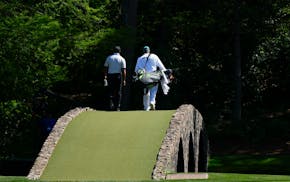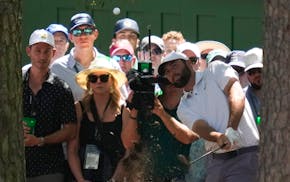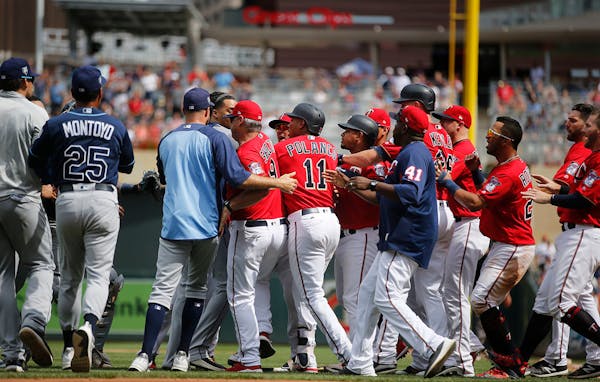This column provides definitive answers to the vexing questions facing Minnesota sports.
Today's vexing question: Following a 9-2 homestand entering the All-Star break, and a walkoff grand slam by Brian Dozier on Sunday, should the Twins try to win the division, or make trades for the future?
Today's definitive answer: Absolutely.
The Twins' new bosses became momentary pariahs last July for trading closer Brandon Kintzler and starter Jaime Garcia in the 48 hours before the trade deadline.
This July, will they recognize that their team is a long shot to make the playoffs, and trade veterans? Will they try to improve this year's team, knowing that Ervin Santana, Miguel Sano and Byron Buxton could be back soon?
Strangely, they might be able to do both. They could trade away a member of their rotation for prospects without damaging the team's shot at the playoffs.
Last year the bosses tried to weaken the team at the deadline … and failed. The Twins were 50-53 before the deadline and 34-24 after.
This year, the Twins could trade Lance Lynn for prospects and not give up on chasing Cleveland for the AL Central title. Lynn has been a disappointment, but after posting an 8.37 ERA in April, his ERA was 3.76 in May and 2.83 in June. (It's 7.82 through three starts in July.)
Lynn has enough of a track record and a strong enough résumé in the NL to attract interest. The Twins could contend with this rotation: Santana, Jose Berrios, Jake Odorizzi, Kyle Gibson and either Fernando Romero, Adalberto Mejia or Stephen Gonsalves.
If the Twins don't think Gibson's strong performance this season is sustainable, they might be able to trade him for more value than they would get for Lynn, because Gibson is under team control for another year.
(A year ago, I was asking for Gibson to be placed on a slow submarine to Atlantis. I was wrong. He has re-established himself as a quality big-league pitcher.)
Dozier is at the heart of the most vexing of these questions. He is an important personality in the clubhouse and helped rally the team last year. He has swung better of late and is capable of carrying the team down the stretch.
The Twins clearly don't intend to sign Dozier to a lucrative long-term contract. That leaves them with three choices: Let him leave in free agency and get nothing; make a qualifying offer so they get a draft pick if he leaves or makes about $18 million for one year if he accepts; or trade him now.
If the Twins aren't willing or able to trade him for value and if he recognizes that free agency is no longer a free-spending jamboree, he might take the qualifying offer. If the Twins are intent on Nick Gordon being their second baseman next season, they won't want to pay Dozier $18 million to block Gordon, who is hitting .242 at Class AAA Rochester.
I'd keep Dozier and give him a qualifying offer. There is no guarantee Gordon will be ready to hit in the big leagues next year, and this year's team won't have a chance to catch Cleveland without Dozier.
"This team is capable of doing something special down the stretch," Dozier said. "We did it last year."
I asked Twins Chief Baseball Officer Derek Falvey if last July's decisions will inform this year's.
"Year to year, you look at it differently," he said. "Last year, we felt like there were unique ups and downs. By July 31 you've got to make some calls. I looked at it the other day, and 80 percent of the trades that are made in July are made the last four or five days. So we all talk about it for about 45 days, and the reality is that everything gets done the last four or five days.
"We certainly learn more week to week as we go. We haven't played the way we had hoped to start the year. We've played better of late. … There's lots of things we can continue to learn about our club, but at the same time we have to be open minded about what helps us in the future, to make sure that we're always thinking about building the right kind of base moving forward.
"I don't think last year necessarily informs anything about this year other than that we're always staying open-minded about short-term and long-term decisions."
Falvey and GM Thad Levine were hired to modernize the baseball department, deepen the farm system, develop pitching and set the franchise up for a decade-long run of success.
This month, Falvey and Levine might be able to do all of that without hurting this team's chances. The idea is almost as strange as Sunday's brawling, balking, walking-off victory.

Souhan: Why Tiger Woods should keep swinging
Souhan: Scheffler wins Masters again, shows what makes him special
Morikawa falters in final round at Masters

Keeping up with the Joneses who helped design Augusta National's classic back nine


